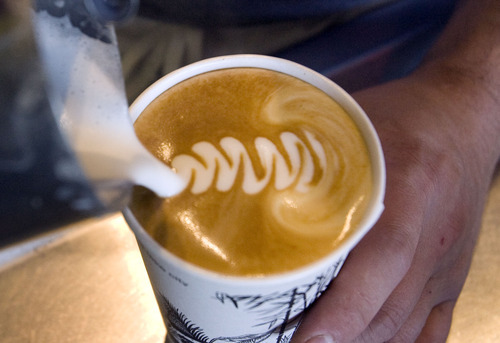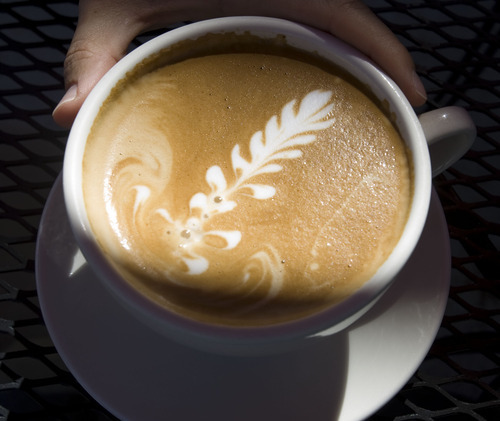This is an archived article that was published on sltrib.com in 2011, and information in the article may be outdated. It is provided only for personal research purposes and may not be reprinted.
Could a few cups of joe water down the blues?
A new study from Harvard released Monday suggests that the more coffee women drink, the less likely they will become depressed.
But the advice may be hard to swallow in Utah, which has some of the nation's higher rates of depression.
A majority of Utahns define themselves as belonging to the LDS Church, whose "Word of Wisdom" forbids drinking "hot drinks" — defined by the church as tea and coffee.
Nearly 20 percent of Utahns have been diagnosed with depression, ranking it ninth in the country, according to the Centers for Disease Control and Prevention. And women are disproportionately affected: About 17 percent of Utah women with commercial health insurance took antidepressants in 2009, according to Utah Department of Health data.
LDS Church members are free to drink other caffeinated beverages — but Monday's study didn't show any protective benefit of a Coca-Cola or Mountain Dew.
Researchers from the Harvard School of Public Health and their colleagues analyzed the amount of caffeine consumed by more than 50,000 women who participated in the Nurses' Health Study. Women who had not been diagnosed with depression in 1996 were followed through June 2006, with researchers measuring their consumption of coffee, including decaf, tea, caffeinated soft drinks, caffeine-free sodas and chocolate.
The study, published in the American Medical Association's Archives of Internal Medicine, found the more cups of coffee they drank, the less likely they were to develop depression.
Compared to women who drank one cup of coffee with caffeine or less a week, those who drank two to three a day had a 15 percent decreased risk for depression. Those who drank four or more a day had a 20 percent drop in risk.
The study is observational so "we cannot prove it's really caffeinated coffee that decreases the risk of depression," said Michel Lucas, one of the study authors.
Still, Lucas said he increased the amount of coffee he drinks based on his study.
"We all know that caffeine has an impact on mood," he said. "There's a lot of people around the world drinking coffee."
The study shows a "possible protective effect" of coffee, but the authors noted that more studies need to be done. This is thought to be the first large-scale study of the effects of coffee consumption on women's mental health.
A study on men found reduced depression risk for those who drank coffee. And two other studies have found a decreased risk of suicide among people who drink more coffee, according to Monday's study.
Combined with other research showing caffeine has no effect on cardiovascular disease and modest effects on inflammation and cancer, "these results reassure coffee drinkers that there seem to exist no glaringly deleterious health consequences to coffee consumption," wrote Seth A. Berkowitz, in an editor's note to the study.
But he said it would be "premature" for doctors to recommend coffee consumption until a cause-effect relationship can be determined.
As a psychostimulant, caffeine in low to moderate doses increases alertness and can improve cognitive functions and increase feelings of well-being and energy, according to this and other studies. But studies have also shown that too much caffeine can trigger anxiety and reduce sleep, which could contribute to depression.
At the University Neuropsychiatric Unit, patients who are anxious or severely depressed are asked to back off the caffeine, said inpatient psychiatrist Jason Hunziker, because the stimulant could cause more problems. Some psychiatric units in the Salt Lake Valley require a doctor's order for patients to have caffeine, he noted.
Anecdotally, he said people with the type of depression that leads to fatigue and lack of motivation drink stimulants like coffee. "Some people do use caffeine to self-medicate their low mood."
Monday's study showed an insignificant decreased risk of depression for the women who drank the most caffeine from non-coffee sources — about 150 milligrams of caffeine from the equivalent of more than three sodas — compared to women who had the least amount of caffeine from non-coffee sources.
The lack of a connection could be because few women in the study ingested much caffeine from non-coffee sources. Worldwide, 80 percent of caffeine is consumed in coffee. And it would take drinking about three sodas to equal one cup of coffee.
Lucas said "nobody" would recommend people increase the amount of soda they drink. Soda has been linked to the nation's obesity epidemic due to its large amount of calories and sugar, and because imbibers don't reduce the amount of other calories they consume to offset the drink.
"It's a very bad habit to have," he said. "It's the kind of stuff I never want my kids to drink."
Susan Mitchell, program director of the alcohol and drug treatment program at Valley Mental Health, can see how coffee helps women in her residential program. Even women who are getting treatment for addiction to stimulants like methamphetamines and cocaine are allowed the caffeine stimulant, she said.
"Their mood is going to be very low when they come off [the illegal drugs]," Mitchell said. "Coffee is a big deal to these people because it does help them feel better."
Mitchell can personally testify to what a good cup of java can do, too. "I feel much more alert and ready to dive into the day after I have my Starbucks."
Coffee and women'smental health
Harvard researchers examined how much caffeine was consumed by more than 50,000 women in the Nurses' Health Study, thought to be the first large-scale study of the effects of coffee consumption on women's mental health.
Compared to women who drank one cup of coffee with caffeine — or less — a week:
Those who drank two to three a day had a 15 percent decreased risk for depression.
Those who drank four or more a day had a 20 percent drop in risk.





